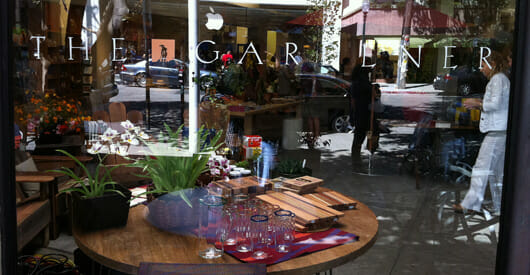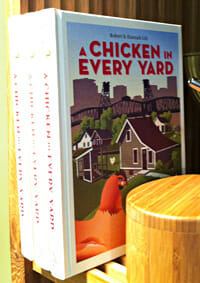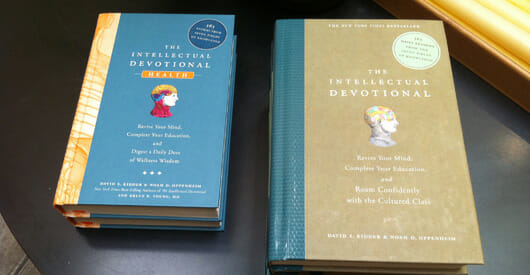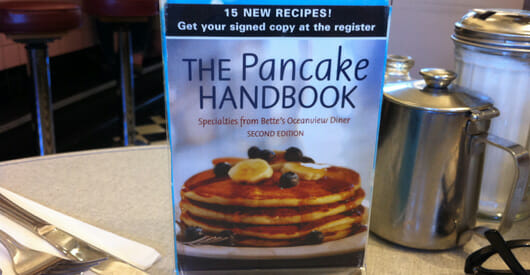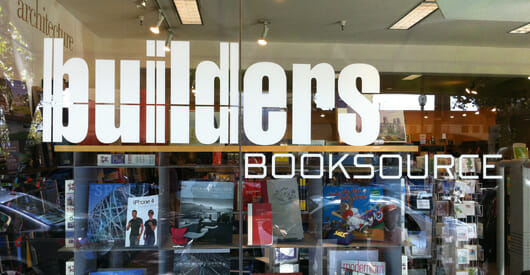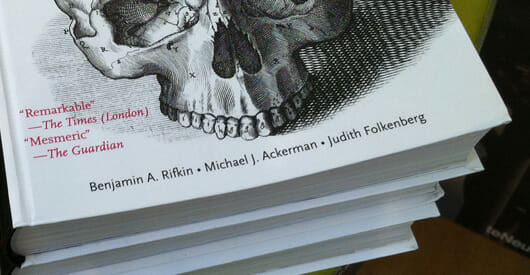It’s summer, and despite the hurricane warnings elsewhere, a sunny Sunday is likely to draw us out to enjoy the season and do some constructive ambling.
We headed over to Berkeley, a short trip across the San Francisco Bay and landed on 4th Street, a popular shopping destination. Jill wanted to have a look inside The Gardener, a lovely shop selling gardning supplies, outdoor decor and a variety of related products.
Throughout the store, in every department, were books that related to the themes inside the store. The first one that caught my eye was this:
A Chicken in Every Yard looks to be an authoritative and practical guide to raising chickens in your backyard. But what struck me about the book was the colorful and effective casewrap binding.
This is a style of hardcover where paper or cloth is printed and then wrapped onto the cases that make up the hardcover itself. They are glued on, becoming an integral part of the book, unlike a dust jacket.
Casewrap books are great for lots of applications, and they have always seemed underutilized by self-publishers, who may simply not know about this binding style, or that they can easily do this with their own books.
Hey, Casewraps are Everywhere
As we continued touring the store, I was amazed at how many casewrap books they were carrying. I found this:
A terrific typographic cover printed on green cloth. The hardcover makes it more useful in the kitchen, and the casewrap eliminates the messiness of a jacket.
This book also shows that designers love casewrap books because they introduce a completely different element: texture. Some of these books are high gloss, with film lamination on the wrap. But many are printed on textured papers or cloth, creating another way for the reader to enjoy their interaction with the book.
Then I turned up these:
These two books from the Intellectual Devotional series use their casewrap covers to create a book that feels a bit like a primer, which may be what the design was intended to do. They make sturdy and long-lasting books.
Here’s another:
This cover is printed on a nubby paper, and the high-visibility orange ink is perfect for the positioning of this book. How about this one:
In this case the cover is brilliantly printed in full color, and the spine gets a cloth wrap. This cover immediately shows how colorful the book is and the quality of the photography.
Time for Lunch
There were even more casewrap hardcovers in the store, but it was time for lunch, so Jill and I headed across the street to one of my all-time favorite lunch places, the amazing Bette’s Oceanside Diner. I was having one of their incredible fish tacos when I spotted this on the table:
Bette’s is also known for breakfasts, and for their great pancakes. They have a book out, and every single diner gets an ad for the book right along with the sugar. That’s a great example of how effective selling outside the bookstore can be. There’s no better market for this book than the people sitting at Bette’s enjoying those pancakes. Good going, Bette!
Builder’s Booksource
After lunch we made a couple more stops, and one was at the Builder’s Booksource. This is a bookstore devoted to books for contractors, designers, landscapers, ecologists and related crafts and interests. It’s incredibly popular, and a great example of the kind of bricks-and-mortar store that will continue to thrive even when others are closing.
Inside there were many more examples of casewrap books. Partly this is because books for contractors or other people who work outdoors often need sturdy bindings. Dust jackets are impractical, and the casewrap is perfectly suited both to this use and to the general aesthetic of these books. Take a look at this one:
Axel Vervoordt: Wabi Inspirations is from the interior design guru of the same name. Here the printing is done on a soft finish paper with a full-bleed reproduction of one of the beautiful photos from the book. Although there’s no reason this has to be a hardcover, the binding immediately marks the book as special and precious.
Okay, last one:
This book presents current developments in city planning and architecture in East Asia. Here the printing is on smooth uncoated paper, and all printing is in black. The graphic look of this book is striking and communicates its subject matter well.
One downside to casewrap books can be seen on this copy of Human Anatomy, which I saw at The Gardener.
This book has a cover wrap that’s been printed and then film laminated. Notice that the front cover on the top copy is quite warped. This may be due to humidity or to a manufacturing defect, or even to use as a sample copy in the store. But if done improperly, you can get this type of warping on covers with lamination. Why?
The laminate is impervious to moisture, it’s actually a sheet of film that’s bonded to the cover by heat and pressure. The other side of the cover is covered with paper, which can absorb moisture. The difference between the two materials can cause warping when there’s humidity present. Don’t know if that’s what’s going on here.
Sadly Neglected
As self-publishers we should realize that we have all styles of books available. For manuals, textbooks, books intended for heavy use both indoors and out, books that will be used in inhospitable environments, think about casewrap books. They add variety, interest and texture to your book design, and might be just the thing or to make your next book stand out from the usual paperbacks and jacketed hardcovers everyone else is doing.


